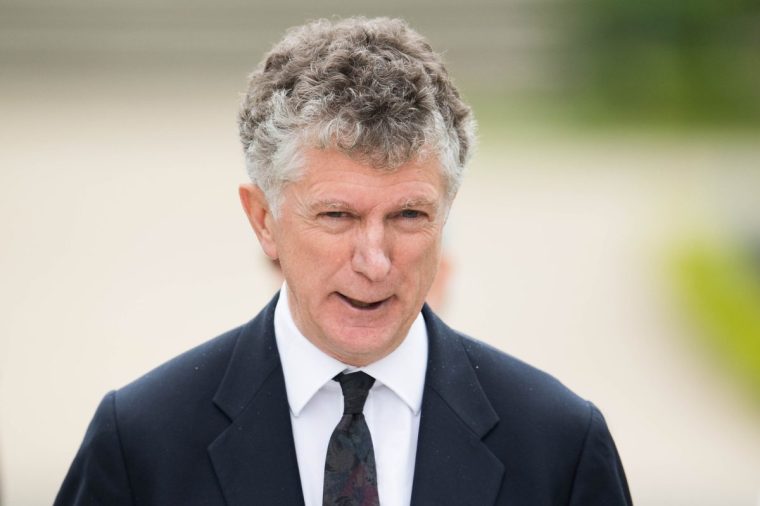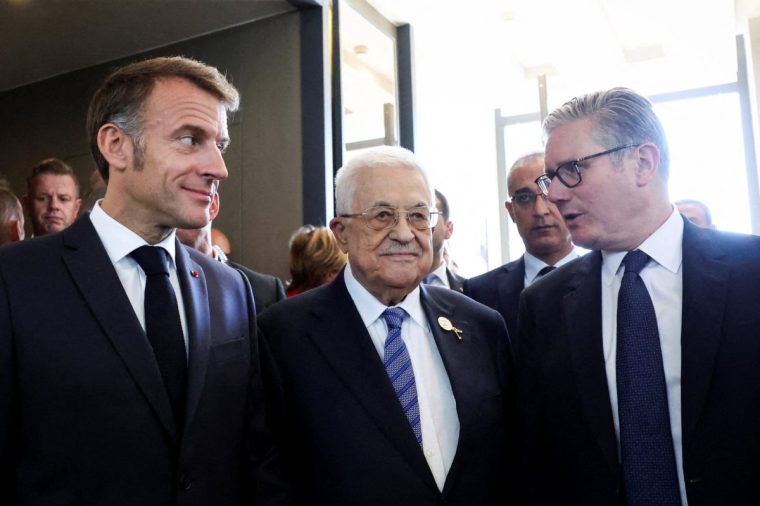The landmark decision helped pave the way for the Gaza ceasefire agreement secured last week – and win over President Trump, insiders said
Britain’s recognition of a Palestinian state played a crucial role in winning the confidence of Arab states to sign up to Donald Trump’s Gaza peace deal, diplomatic insiders have said.
The UK formally recognised a Palestinian state in late September, along with allies including France, Australia and Canada.
Those close to negotiations said the UK’s recognition of Palestine helped pave the way for the landmark ceasefire agreement secured last week – and win over President Trump.
Sir Keir Starmer said after returning from the Gaza peace summit in Egypt that he was “proud” of Britain’s “behind the scenes” contribution to the peace process amid a row over the Government’s influence in securing the deal.
“We’ve worked behind the scenes for months with the US, Arab and European nations, to help deliver a ceasefire, get the hostages out, get aid in and secure a better future for Israel, Gaza and the West Bank,” the Prime Minister told Parliament on Tuesday.
“We are in a position to play this role precisely because of the approach this Government takes. That does include our decision to recognise the state of Palestine.”
Row over the British role in Gaza deal
This week, Mike Huckabee, the US ambassador to Israel, called Education Secretary Bridget Phillipson “delusional” after she said the UK had played a “key role behind the scenes” in shaping the Gaza ceasefire.

However, those comments were slapped down by Trump’s special envoy, Steve Witkoff, who has been leading the peace process on behalf of the US. He paid tribute to the “vital role” played by Britain in “assisting and co-ordinating efforts that have led us to this historic day in Israel”, singling out Starmer’s national security adviser, Jonathan Powell.
Starmer said on Tuesday: “I am proud of what Steve Witkoff said about our national security adviser. He was negotiating this, he knows absolutely the role we played… We played that role only because of the relationship that this Government has with the Trump administration. We are a trusted partner, working both before this peace deal and afterwards.”
Why recognising Palestine was so crucial
One European diplomatic insider said that the decision by the UK – as well as France – to recognise Palestine was made partly to win the support of Arab states, who were reluctant to buy in to the peace deal without assurances from European countries that they were committed to the long-term future of Palestinians and that they would not leave the region to rebuild Gaza alone.
Recognition of a Palestinian state is a necessary step towards a two-state solution and ensures that any further annexation of Palestinian territory would be met with a response from the international community, experts have said.

Another source close to the discussions said that while it was not a quid pro quo, the recognition was a “crucial step to create the conditions for this breakthrough,” and that the UK had helped secure recognition from Australia and Canada.
A senior Government source said: “Obviously without over-claiming, I think it is widely recognised that the various countries making that step at the same time was a material factor in getting the buy-in from Arab states on Hamas having no role in future role of Gaza, which is obviously a key part of the peace plan.”
State recognition was critical to ensuring the co-operation of the Palestinian Authority (PA) – which exercises limited self-rule in the occupied West Bank – in the peace talks, the insider said.
Under Trump’s plan, the PA will eventually take control of Gaza – following a period of significant internal reform.
Britain’s recognition of Palestine helped to persuade the PA to sign a document of suggestions for its internal reform, including denouncing the October 7 attacks as terrorism, which were necessary to make it acceptable to Israel.
Husam Zomlot, the Palestinian ambassador to the UK, told Sky News this week that Britain’s recognition had been a “moment of leadership”, adding: “That moment three weeks ago, when the UK did recognise, is a moment when we can say that the wheels of history are turning in a different direction.”
The issue of Palestine’s recognition was also raised by the Gulf states in every meeting they had with the UK about Gaza, the source said, in part because it was politically important for them at home.
Move was presented to Trump as ‘historic’
Some Gulf states, including Saudi Arabia, have tentatively agreed to establish relations with Israel if a Palestinian state is also established.
This would lay the groundwork for a two-state solution, which the UK considers the only way to secure long term peace in the decades-old Israel-Palestine conflict.
“We needed something like this to get the Arab states and Palestinian Authority on board. It also meant we could go to Trump and say, what we’ve done is historic,” the second source said.
The diplomatic insider said the UK had helped “draw a Venn diagram” of competing interests, and that then-foreign secretary David Lammy was central to the process, showing the UK’s ongoing role as a “bridge power”.
The different stakeholders, such as France, had traditionally communicated with the US separately, making it harder for the US to come to a consensus, but the legwork done by the UK and allies allowed both the European and Arab states to approach Trump with a unified voice, significantly increasing the plan’s chance of success.
The ceasefire so far appears to be holding, though it was rattled on Tuesday morning when six Palestinians were reportedly killed by Israeli fire.
Israel’s military said it opened fire to remove a threat posed by suspects who approached its forces in the northern Gaza Strip, saying they had crossed the boundary for the initial Israeli pullback in a violation of the deal.
